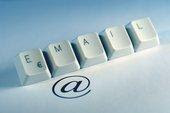
"More than 90% of Internet users between 18 and 72 said they send and receive email, making it the top online activity just ahead of search engines", according to the non-profit research group Pew Internet and American Life Project (Feb 2009).
As a user, you may be wondering what exactly the guidelines for proper email etiquette are and questioning whether this tool has actually simplified our lives or made them more complicated. We have devised a list of the top 16 rules of email etiquette we believe take into consideration OPF's (other people's feelings) as well as protect our own.
As a user, you may be wondering what exactly the guidelines for proper email etiquette are and questioning whether this tool has actually simplified our lives or made them more complicated. We have devised a list of the top 16 rules of email etiquette we believe take into consideration OPF's (other people's feelings) as well as protect our own.
- Designate time each day to review emails in your inbox. Since we are inundated with email 24/7, it is important to put aside a couple of times during the day to sit down and go through them in a calm fashion. The exception: timely business emails which require your immediate attention and response.
- Return emails within 24-48 hours. Similar to a phone message, it is courteous to return all email communications within a one to two day time period.
- Check your Spam or Junk Email Folder. Unfortunately, email sometimes makes its way into these folders without any rhyme or reason. It is your duty to check them daily to make sure no emails were inadvertently misplaced. This is especially crucial if someone says they are sending something to you and you have not received it. Please remember to double-check these folders first before requesting that an email is re-sent.
- Return all emails in-kind. If someone is pouring their heart out to you in an email, don't respond with a brusque retort. This is the equivalent of a one word answer in conversations. Consider the sender's feelings and respond with an email that is reciprocal of the one that was received.
- It's okay to respond even if you can't respond. If someone sends an email that requires a response and you can't get to it right away, at least have the decency to let them know you will be addressing it shortly and will get back to them as soon as possible. This will prevent hurt feelings and any miscommunication in the future.
- Always include a subject line. A subject line describes the reason for the email, without it, the recipient is lost. Take the extra second and include a subject line in all communications. This allows the recipient to determine the relevance of your communication and also to categorize it and refer back to it in the future.
- Refrain from sending personal emails with a Request Read Receipt or Request Delivery Receipt. This is bothersome and puts the recipient on the defense. Unless you are the IRS or the CIA, your message does not require this extra measure.
- Remember that email addresses are private. Big corporations go to great lengths to obtain personal email addresses. Refrain from sending mass email communications with the email addresses on display for all to view. It is much more polite to send mass communications to a group email name or by Blind Copy ("bcc") to protect people's privacy.
- Be careful with "Reply", "Reply All" and "Forward". If you accidentally hit the wrong button, it may come back to haunt you. A few years ago, I mistakenly hit the "Reply" button when I meant to select the "Forward" button and landed in some pretty hot water. Trust me, you want to double and triple check yourself before hitting Send.
- Remember that email is a permanent record. Be very careful what you write in an email because everything can be used against you. These communications are forever embedded in servers. If you must vent or say something truly unpleasant, a face to face conversation is always best.
- Digitally file and/or back up all business emails. I recently had to access some emails from several years ago to verify a business matter in which I'd been wronged. These email documents were the proof I needed to win my case.
- Don't assume everyone has the same humor as you do. There is nothing more annoying than having to filter joke emails or chain letter emails when you are busy at work. Please save these communications for your most intimate friends or spare us and yourself and don't send them at all.
- Email thank you notes are fine, but if you truly want to make a lasting impression then a handwritten thank you note is much more impressive.
- Refrain from emailing in all CAPITAL LETTERS. It is the online equivalent of shouting!
- Review all spelling, grammar and punctuation before pressing the send button. Remember your emails are a reflection of you and you always want to make the best impression whether in person or online.
- End emails on a positive and upbeat note. If you're hitting writer's block and need some pointers, check out some of the most popular email closings and their meanings.
Do you have any particular pet peeves when it comes to emailing? Would you like to add an etiquette rule to our list?
1) Send us a message on Facebook
2) Email us at protocallout@beverlyhillsmanners.com
3) Follow us on Twitter at @protocallout
4) Comment on this blog entry

No comments:
Post a Comment